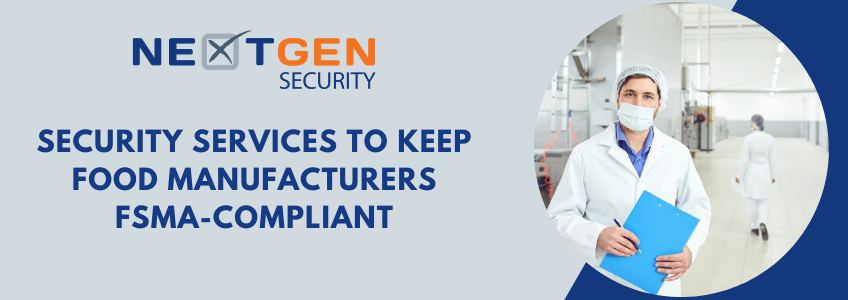NextGen is proud to serve clients across many industry sectors. We work vigorously to keep facilities safe and secure and, wherever applicable, in compliance with mandated regulations. As part of The Food Safety Modernization Act (FSMA), which was signed into law to further protect our country’s infrastructure from external threats, many food manufacturing facilities are now preparing for Compliance Audits. The audits are designed to assess a facility and confirm it is adhering to preventive practices to keep their food safe.
Specifically, the FDA has issued seven rules to be followed that focus on preventing contamination throughout the entire food supply chain. They span:
Rule One: Produce Safety
Focused on reducing the risk of contamination of produce, this rule establishes minimum standards to safely grow, harvest, package, and hold fruits and vegetables.
Rule Two: Controls for Human Food
FSMA requires food facilities to have a written food safety plan that includes hazard analysis, preventive controls, and management of these controls.
Rule Three: Controls for Animal Food
Similar to Rule Two, this rule requires facilities that create animal products to have an animal food safety plan with hazard analysis, preventive controls, and management of these controls.
Rule Four: Foreign Supplier Verification Programs (FSVP)
This rule was established to ensure foreign suppliers meet the same safety standards as US suppliers.
Rule Five: Accredited Third-Party Certification
This rule is a voluntary program to accredit third-party vendors for food safety audits.
Rule Six: Transportation of Human and Animal Food
This rule applies to shippers, receivers, loaders, and carriers who move both ingredients and finished food products by motor or rail vehicle and is focused on preventing contamination of food during transportation. It includes requirements such as maintaining adequate temperature controls during transport.
Rule Seven: Prevention of Intentional Adulteration
This rule requires food manufacturers to assess their facilities, determine how they can reduce the risk of intentional adulteration—that is, the purposeful introduction of substances with the intention of contaminating an ingredient or food product in order to cause widespread economic or physical harm. Generally speaking, the intentional adulteration of food is an attack on the safety of the food supply.
Rule Seven is especially significant as it pertains to knowing – and controlling – who is inside a food processing facility at any given time. NextGen’s Visitor Management solutions have been key in keeping our food manufacturing clients compliant.
With a NextGen Visitor Management system, you can:
- Centralize visitor policies and guidelines;
- Ascertain who every visitor is;
- Allow security staff to receive and view video feeds and deny or grant access;
- Dictate which specific areas of the facility a specific visitor is allowed access to;
- Provide a printout of a visitor’s credentials and a confirmation of who they came to see and when as well as which area they were granted access to, and when they left the premises.
- Have an audit trail in the event that evidence is needed after an incident has occurred.
A well designed and implemented Visitor Management System gives you the peace of mind of knowing – and controlling – who’s entering and exiting 24/7. It can track exactly who is accessing your facility and keep you in compliance with the FSMA requirement that you maintain precise details of each and every visitor.
Call on NextGen’s experience and expertise for all your Visitor Management needs.

